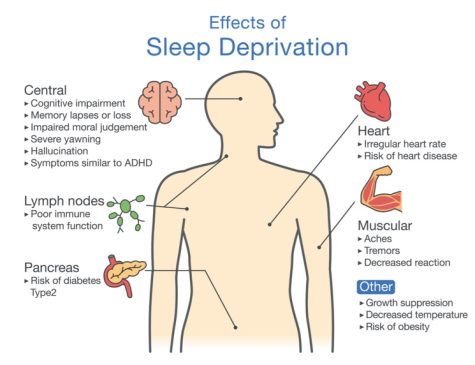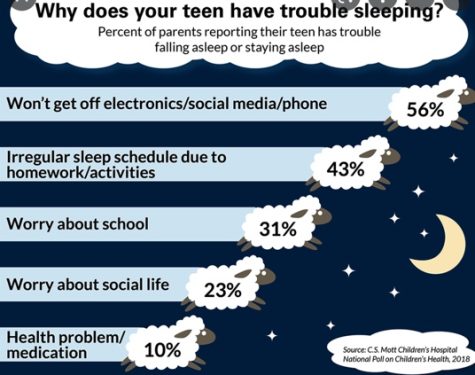Effects of Sleep Deprivation on Adolescents

Most of us, at some point, have stayed up late into the night in an effort to get our project done at the last minute, finish up cramming for a test, or maybe just to curl up watching YouTube videos. It feels fine at the time, perhaps due to all the coffee you’ve been chugging, and we may laugh off our sleepiness the next day. However, sleep deprivation can be a slow and silent predator, and you may feel the cumulative effects long after your all-nighter.
 Adolescents ages 13-18 require eight to ten hours of sleep per day (for example, falling asleep at 10 p.m. and waking at 6 a.m. to receive the minimal amount of sleep). Though this recommendation may vary depending on the person, most students probably receive fewer hours each night. In the short-term, the effects are relatively well-known: crankiness, lack of focus, forgetfulness, and, of course, feeling tired. These issues can usually be rectified with a power nap to get your mind back on track. What is less widely known is the concept of sleep debt: when you lose sleep once, it can take several days to make up for it. Though you may be able to reclaim some over the weekend, sleeping in may mess up your sleep schedule. After a certain amount of sleep debt, your sleep is unable to be reclaimed.
Adolescents ages 13-18 require eight to ten hours of sleep per day (for example, falling asleep at 10 p.m. and waking at 6 a.m. to receive the minimal amount of sleep). Though this recommendation may vary depending on the person, most students probably receive fewer hours each night. In the short-term, the effects are relatively well-known: crankiness, lack of focus, forgetfulness, and, of course, feeling tired. These issues can usually be rectified with a power nap to get your mind back on track. What is less widely known is the concept of sleep debt: when you lose sleep once, it can take several days to make up for it. Though you may be able to reclaim some over the weekend, sleeping in may mess up your sleep schedule. After a certain amount of sleep debt, your sleep is unable to be reclaimed.
 Once you get to this point, you may encounter the more long-term effects of sleep deprivation. This includes a higher risk of injury, poor health, obesity, reduced quality of life, changes in appetite and metabolism, and higher difficulty of sleeping overall. In teenagers, it may also lead to higher chances of self-harm and suicidal thoughts/actions. Other side effects can include higher levels of stress and emotional distress.
Once you get to this point, you may encounter the more long-term effects of sleep deprivation. This includes a higher risk of injury, poor health, obesity, reduced quality of life, changes in appetite and metabolism, and higher difficulty of sleeping overall. In teenagers, it may also lead to higher chances of self-harm and suicidal thoughts/actions. Other side effects can include higher levels of stress and emotional distress.
Having enough sleep is correlated with life satisfaction, fulfilling relationships, better memory, greater achievement in creativity, reaction time, efficiency, and abstract thinking. If you have trouble sleeping, you can try to turn off your electronics in the hours before you sleep, avoid caffeine in the late afternoon and evening, and avoid long naps. However, the most effective way to help your sleep is by sticking to a schedule. Though it can vary a bit, try to go to bed at the same time every night, and wake up at roughly the same time every morning (even the weekends!). If you try to keep up with your sleep, you might find yourself feeling a little better every morning.

Aleena is the Editor-in-Chief of the Keynote and a senior at Keystone. She enjoys reading, writing, and baking in her spare time and looks forward to discussing...
